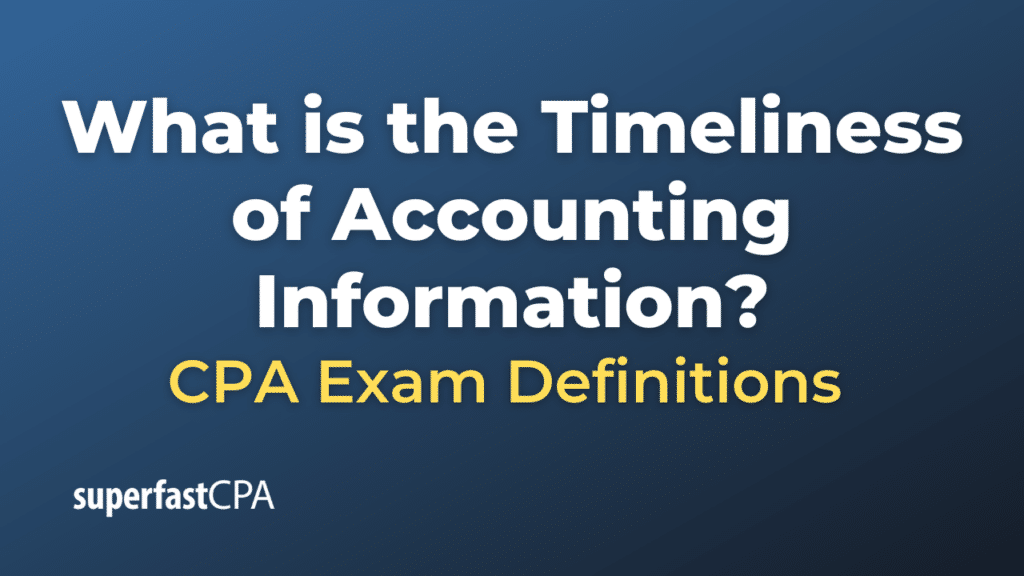Timeliness of Accounting Information
The timeliness of accounting information refers to the speed or delay with which financial data is reported and made available to users after the events to which they pertain have occurred. In accounting and finance, timeliness is one of the qualitative characteristics of useful financial information.
Timeliness matters for several reasons:
- Decision-making: Financial statement users, such as investors, creditors, managers, and other stakeholders, rely on timely information to make informed decisions. Delayed information might be outdated, rendering it less useful for current decision-making purposes.
- Relevance: The more timely the information, the more relevant it is. As time passes, the relevance of financial data can diminish, potentially leading to suboptimal or incorrect decisions.
- Market Efficiency: For public companies, timely release of financial results can help ensure that the company’s stock price accurately reflects its performance and position.
- Regulatory Compliance: Many jurisdictions have regulatory requirements specifying how soon after the close of a fiscal period companies must publish their financial statements.
- Credibility & Trust: Regular and timely reporting can instill confidence in shareholders and potential investors, reinforcing a company’s image of transparency and reliability.
However, it’s crucial to balance timeliness with accuracy and completeness. Rushing financial statements can lead to errors or omissions, which can be just as detrimental as late information. Thus, companies often have to strike a balance to ensure that financial information is both timely and accurate.
For instance, public companies in the U.S. are required by the Securities and Exchange Commission (SEC) to file quarterly reports (10-Qs) and annual reports (10-Ks) within specific time frames after the close of their fiscal quarters and fiscal years, respectively. These regulations ensure that public investors receive timely information about the companies in which they’ve invested.
Example of the Timeliness of Accounting Information
Let’s delve into a hypothetical example to illustrate the importance of the timeliness of accounting information.
Scenario: TechUp Innovations Inc.
Background:
TechUp Innovations Inc. is a tech startup that has developed a groundbreaking AI software tool. The company went public last year and has a significant following among tech investors. Their fiscal year ends on December 31st, and they are expected to release their annual financial statements by March 1st, in accordance with regulatory requirements.
Situation:
By the end of February, TechUp’s accounting team realizes they’ve encountered some complexities in their financial data due to various international transactions. They feel that they might need another month to ensure the financial statements’ accuracy and completeness.
Potential Implications:
- Delay in Reporting: If TechUp decides to delay the release to ensure accuracy, they would not meet the regulatory deadline, which could result in penalties and negative investor sentiment.
- Investor Concern : Delayed financial information might lead investors to speculate about the company’s performance or suspect internal issues, even if the delay is purely for accuracy’s sake.
- Stock Price Volatility: The stock market dislikes uncertainty. The delay could lead to stock price volatility, with potential drops due to investor uncertainty.
- Decision-making Impact: Potential partners waiting on the annual results to decide on collaborations or investments might be left in the lurch, potentially jeopardizing business opportunities.
Outcome:
To address the situation, TechUp’s management decides to:
- Release a preliminary report by March 1st that provides an overview of the company’s performance, explaining the delay and assuring stakeholders that the final, detailed report will be out by the end of March.
- Hold a press conference and investor call to provide more context, ensuring transparency and addressing concerns.
- Accelerate the accounting process with additional resources, ensuring both timeliness and accuracy for the final report.
Conclusion:
This approach demonstrates the company’s commitment to transparency and regulatory compliance. By communicating proactively, TechUp manages to uphold the value of timely information while also ensuring accuracy.
This example highlights the delicate balance companies must maintain between timeliness and accuracy in financial reporting. While timely information is crucial for decision-making and maintaining trust, it must also be reliable and accurate.













